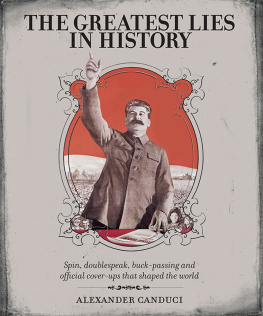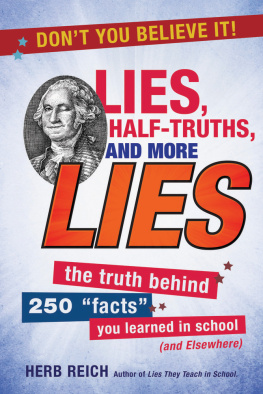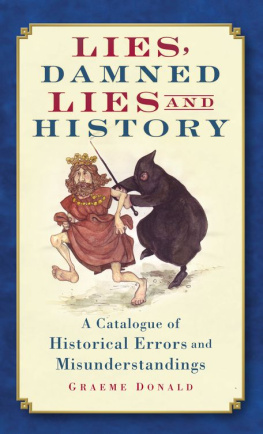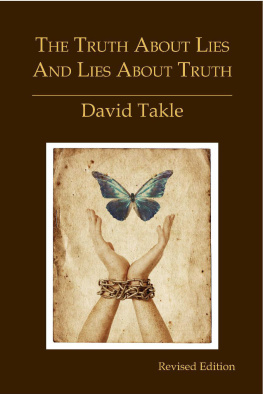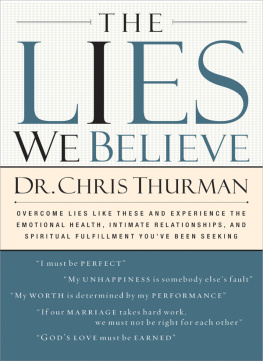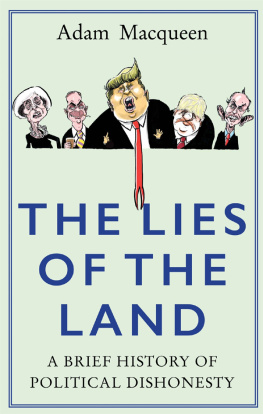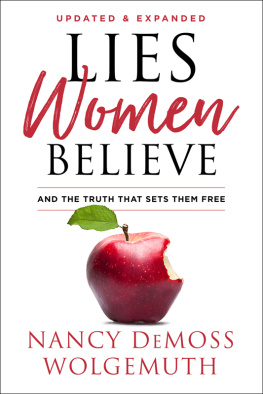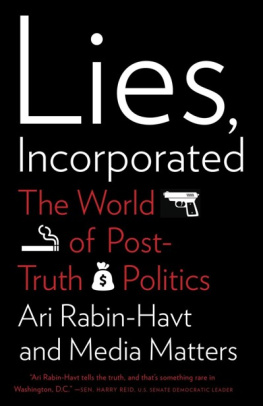
To my beloved wife Teresa, whose unwavering faith and support have given me the strength and self-belief to pursue my dream.

CONTENTS

In order to reduce their power and that of their papal supporters, the Knights Templar were cast as heretics.
The history of our race, and each individuals experience, is sown thick with evidences that a truth is not hard to kill, and that a lie told well is immortal.
MARK TWAIN

Lies and the telling of themwe are all guilty to some extent. From small fibs about forgetting to take out the trash, to big lies about cheating on a spouse; whether we are driven by the best of intentions or the worst of motives, lying seems to come naturally to many Homo sapiensa built-in genetic flaw or a highly evolved protective mechanism in our species, depending on who you ask about it. What is clear, however, is that in 40,000 years of lying, weve become pretty good at it.
It doesnt take much to discover that many pinnacles of human achievement, just as much as our worst moments in history, are inextricably bound with whoppers; that deceptions have played a major part in shaping the course of history and the destiny of nations. Lies have been used to justify wars, to acquire weapons, slaves, fire, food, gold, land, livestock and industrial secrets. Lies have been told to impose the dreams, ideology or religion of one person, or group of people, on the rest of humankind. Lies have allowed some to ascend to the peak of power, wealth and influenceand damn the rest.
This book is about those lies and their consequences.
With the history of the world liberally sprinkled with wars, persecutions and suffering caused by the pursuit of power, most reasonable people today would reject deception and manipulation as acceptable means to achieve social or national goals. Yet many governments continue to use precisely these tactics when the stakes are high enough, or when leaders feel the need to convince their nations to follow them into war. This book examines specific episodes in history to identify the reasons why politicians, religious leaders and others have supported some of the most outrageous lies ever told to justify war, repression, persecution and ambition.
The lies that have been chosen are those that have had some lasting impact upon the world, whether it be the creation of an organisation that has influenced the growth of the modern world, such as the medieval Papacy, or the persecution of a group of people, such as the Jews in the twentieth century. They are lies that have caused enormous suffering, led to wars or crackdowns on human rights, or been used as templates for deception in another country or period. Some of these deceptions have been astonishingly long lived, while others were quickly debunked. What is important, however, is not how successful they were, but that they were attempted at all, and that they played a part in shaping the fate and fortune of our world.
The book is divided into four parts, each identifying a specific theme or type of deception used throughout history. The central theme of each part is illustrated by a number of chapters, arranged in chronological order, giving detailed accounts of grand deceptions along with the truth of what really happened.
: Spin & Doublespeak identifies situations in which a ruler or government has sought to manipulate information in an attempt to cover up a defeat, justify a course of action, or retrospectively give credibility to shabby motives through the use of spinthat is, the obscuring of certain facts and the emphasising of others to create a false impression of a given situation.
: Passing the Buck catalogues a number of famous and not-so-famous events in history that have seen governments and officials pick on a group of people in order to blame them for a disaster that, rightly or wrongly, was initially attributed to those in power. It also includes groups that have been targeted for other reasons, such as greed or envy.
: Official Deceptions & Cover-ups provides examples in which governments have undertaken some grand deception and incorporated the propaganda into their official accounts of history, claiming the deception as fact. Whether it was expunging a ruler from the records, depicting a repressive period as being glorious, or claiming that certain people were not acting in an official capacity during a shameful period in history, it is recounted here.
: Acting Under False Pretences tells of events in which the real motives for a war or campaign of vilification have been replaced by a blatant lie, either conceived by the persons wanting to start the conflict, or by those who sought to turn an episode in history to their advantage. Also included here are events that were hijacked by a variety of disreputable persons under the pretence of good intentions.
Each chapter is divided into three sections. The first portion gives the official version of events: the story as it is known by most people, recounted in history books, or promoted by those responsible for inventing it at the time. Some of these stories are widely known, but others are not.
The second section of each chapter sets out the true account of events, and highlights where the official story is distorted. Sometimes both versionsthe official and the actualwill be the same for some time before diverging; in cases where deception and propaganda have been used to overwrite every aspect of the events concerned, they will deviate from the start.
The final section of each chapter details the legacy of the lie or deception perpetrated. Some may have had a significant impact for only a generation or two while others have continued to reverberate throughout history. In either case, the effect of the lie had a profound effect on the societies in which they occurred.
Certain ancient lies, because of their very antiquity, may seem very distant to us nowadays. Yet their story is important because of the way that individual civilisations or nations have evolved during the centuries that followed the falsehood. And we can remind ourselves what this means by looking at more recent deceptions, such as Watergate, which continue to have a significant and observable effect on the lives of people who live in the world today.
The retelling of these lies, how they came about and what the truth actually is, continues to be of the greatest importance. As George Orwell reminds us in his terrifying novel Nineteen Eighty-Four, He who controls the present controls the past. He who controls the past controls the future. History is not simply the impartial recounting of events that occurred yesterday, last year, or in times of yore. It is always selective because it is literally impossible to include every detail in an account of the past; and history is always shaped by the perspective of the tellersomeone who must construct a narrative that includes certain facts and excludes others, a process that will always be open to criticism and disagreement.
What this book does is examine a number of key events in the history of the world that have been skewed in the telling from the start; it uncovers evidence that has been suppressed, explains why that happened and demonstrates how the accepted accounts of these events need to be rejected for a more sophisticated understanding of what really happened.
Next page
